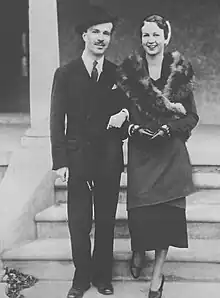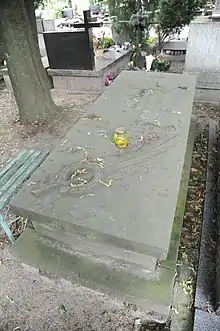Jan Drohojowski
Jan Drohojowski (1901–1979) was a Polish diplomat for the governments of the Second Polish Republic and later, Polish government in exile and the People's Republic of Poland.
Jan Drohojowski | |
|---|---|
 Jan Drohojowski and his spouse, Katharyn Silva (1931) | |
| Born | January 27, 1901 |
| Died | February 1, 1979 (aged 78) |
| Resting place | Powązki Military Cemetery |
| Nationality | |
| Occupation | diplomat |
| Spouse(s) | Silva Cornell (since 1930) Natalia Aszkenazy (since ca 1940) |
| Children | Katarzyna Maria Drohojowska Francisco (Pancho) Drohojowski |

Biography
Born on 27 January 1901 in Tarnów, he began his diplomatic career around early 1920s, but retired following the May Coup (Poland), and emigrated to the United States, where he was a journalist for some Polish-American press.[1]
Following the onset of WWII he became involved with the Polish government in exile, first working in the Polish embassy in the USA. He was Poland's chargé d' affaires to Cuba (1942), a representative to China (1942), a consul in Jerusalem (1943), and following that he became a deputy minister of information and documentation in the government-in-exile until 1944.[1] Following the war he joined the diplomatic service of the communist Polish government, becoming an envoy or an ambassador (sources vary) to Mexico (1945-1951) and Egypt (1952-1952).[1][2][3] He was also a representative of Poland to the United Nations.[1] From April 1952 to April 1953 he was a director of the Powszechna Kasa Oszczędności Bank Polski (1952-1953).[1] He received the Order of Polonia Restituta twice (in 1946 and 1951).[4][5] Following a purge, he was arrested and held until March 1955.[1] He spent the rest of his life as a writer and journalist,[1] publishing several books on Latin America, in addition to his memoirs.
He died on 2 January 1979 in Warsaw.
Personal life
Jan Drohojowski married twice. First around 1930 he married Texaco[6] oil heiress Katharyn Silva Cornell; they had a daughter Katarzyna Maria Drohojowska.[7] They divorced in 1935, with Cornell alleging that Drohojowski "told risque stories...[and] came to lunch in pajamas".[8] Drohojowski requested, but did not receive, alimony from Cornell, "an unusual plea in court annals."[9] Later around 1940 he married his fellow diplomat Natalia Aszkenazy.[10] They had a son, Adam Francisco (Pancho) Drohojowski, born in Mexico in 1947.[7][11]
Bibliography
- Jana Drohojewskiego wspomnienia dyplomatyczne (1959)
- Abraham Lincoln (1962)
- Meksyk bogów, krzyża i dolarów (1962)
- Indianin prezydentem Meksyku (1964)
- Religie i wierzenia w życiu Ameryki Łacińskiej (1964)
- Róg obfitości (1967)
- Ameryka Łacińska z bliska (1968)
- Polacy w Ameryce (1976)
References
- "O nas > Historia > Kierownictwo PKO w latach 1919-2009 > Sylwetki | PKO Bank Polski". 26 June 2012. Archived from the original on 26 June 2012. Retrieved 3 May 2017.
{{cite web}}: CS1 maint: bot: original URL status unknown (link) - Pamiėtnik literacki (in Polish). Zakład im. Ossolińskich. 1 January 1990. p. 242.
- "Ousted Polish Envoy in Cairo Linked to Rioting in January" Corpus Christi Caller-Times (25 April 1952): 14. via Newspapers.com

- RP, Kancelaria Sejmu. "Internetowy System Aktów Prawnych". isap.sejm.gov.pl. Retrieved 3 May 2017.
- RP, Kancelaria Sejmu. "Internetowy System Aktów Prawnych". isap.sejm.gov.pl. Retrieved 3 May 2017.
- "Home sweet Home // Bill Hood Found roots in Tulsa's Historic Maple Ridge".
- Marek Jerzy Minakowski. "Jan Marceli Drohojowski z Drohojowa h. Korczak". Sejm-Wielki.pl. Retrieved 3 May 2017.
- "Says Count Danced in his Shorts" Reading Times (4 October 1935): 21. via Newspapers.com

- "Alimony Denied Polish Count; is Wedded to Texan" The Eagle (3 October 1935): 1. via Newspapers.com

- "Woman Diplomat Tells of Underground" Daily Capital Journal (25 April 1944): 10. via Newspapers.com

- Christian E. Burckel, ed., Who's Who in the United Nations (Burckel & Associations 1951): 129.
Further reading
- Drohojowski Jan. Zgon (2.I.1979). Kultura 1979 nr 2 s.2.; Literatura 1979 nr 3 s.2.; Przekrój 1979 nr 1762 s.3.; Perspektywy 1979 nr 2 s.36.: Rocz.Liter. 1979 s.746-747.; Tryb.Lud. 1979 nr 4 s.4.; Życie Warsz. 1979 nr 3 s.2, nr 5 s.5, nr 6 s.5.; Tyg.Pow